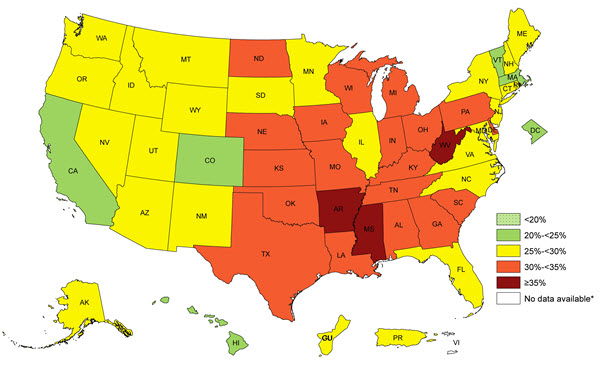Why Your Parents Had an Easier Time Being Thin

By:
You hit up spin class and try to eat healthy. Of course, there might be days when you are too busy or miss out. But, if it ever feels like losing weight or even maintaining a healthy weight is difficult, you’re right.
Despite that millennials are exercising and eating right, new research shows there is a big difference between how you exercise and lose weight compared to your parents.
RELATED: Why Does Stress Lead to Weight Gain?
The journal Obesity Research & Clinical Practice published a longitudinal study out of York University, funded by the Canadian Institutes of Health Research that detailed the relationship between obesity with caloric and macronutrient intake as well as exercise. They concluded that factors external of diet and exercise contribute to the modern day increased average body mass index (BMI).
 Behavorial Risk Factor Surveillance System/CDC - cdc.gov
Behavorial Risk Factor Surveillance System/CDC - cdc.gov
In the National Health and Nutrition Examination Survey researchers took dietary data from more than 36,300 adults from 1971 to 2008. They also input the frequency of exercise of more than 14,400 U.S. adults from 1988 to 2006. So, BMI, age, food intake, and physical activity frequency were all grouped together in one telling data set. Given the same amount of caloric intake or exercise, in a mutually adjusted model, the BMI was up 2.3 kg/m2 higher in ’06 than in ’88.
RELATED: Why This Sugar Makes You Eat More
Ruth Brown, lead researcher on the study and York University graduate student, summarized the results in a statement.
“We observe that for a given amount of self-reported food intake, people will be about 10 percent heavier in 2008 than in 1971, and about five percent heavier for a given amount of physical activity level in 1988 than 2006,” Brown said. “These secular changes may in part explain why we have seen the dramatic rise in obesity.”
So, in fact, your parents actually had it easier maintaining and losing weight even though the millennial generation today exercises more. So what factors make it more difficult to maintain a healthy body today than back when Fonda aerobics were the rage?
York University’s Professor in the School of Kinesiology and Health Science and one of the authors of the study, Jennifer Kuk, attributes body weight to a number of lifestyle and environmental factors including medications, environmental pollutants, genetics, time of eating, stress, gut bacteria, and light exposure at night.
RELATED: America is Shattering Records for Obesity
The study concluded that further scientific research is needed to determine the contributing factors to the increased BMIs of today’s U.S. population.
Consider several factors that may be contributing to the country’s weight gain:
1. Medications
Taking prescription drugs could have an impact on packing on the pounds, and Americans are popping prescription pills more than they were in the ‘90s. Spending on prescription drugs doubled from 1999 to 2008 and the use of taking one or more drugs, two or more drugs, or five or more drugs increased. The most common of these drugs among adults, age 20 to 59, were antidepressants (about one in 10 Americans take an antidepressant medication); and antidepressants are linked to a modest amount a weight gain. Other medications like those for allergy meds, diabetes drugs, and steroids can also impact weight gain.
2. Sleep
The deal is that 40 percent of Americans aren’t getting the recommended seven to eight hours of sleep a day. This is due to society and the large number of people (50 to 70 million Americans) who suffer from sleep or wakefulness disorder.
An average lack of sleep can impact a number of processes in your body, including decision-making. A lack of sleep increases risk for insulin resistance, as the mitochondria in cells are less able to break down sugars. Sugar that is not processed stays in your blood stream, which results in high blood sugar.
Metabolism slows because the body is trying to preserve its resources, as the hormone leptin signals to your body that you are full decreases as the hormone ghrelin, that tells you when you are hungry, increases. We also tend to eat more calories if the body is sleep deprived.
RELATED: The High Cost of Obesity to Society
3. Gut bacteria
The phrase “gut bacteria” may be the least sexy sounding bodily phrase, but it’s incredibly important. High levels of red meat and egg consumption as well as high levels of artificial sweeteners (in all of the low-calorie, low-fat pre-packaged foods and sodas) can contribute to the changing makeup of gut bacteria. Long-term diet patterns can alter the composition and workings of the important gut bacteria that play a role in losing, maintaining and gaining weight.
These factors turn the traditional ideology—that a caloric deficit combined with exercise will result in weight loss—upside down; it’s not that simple.
The bright side of this study is that it may offer a bit more explanation to why you can't shed those last five pounds or how you continue gaining weight while engaging in an active lifestyle. Take a deep breath, don’t be so hard on yourself, and implement (with the help of a medical professional) actionable lifestyle and environmental changes that may result in welcomed health benefits.
